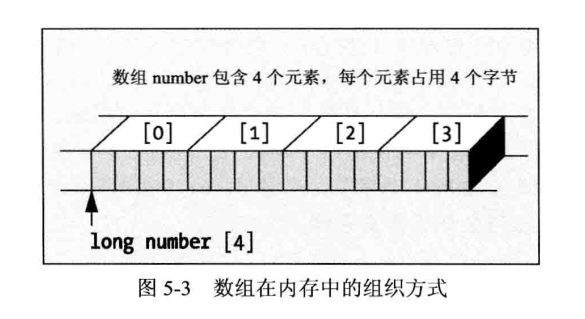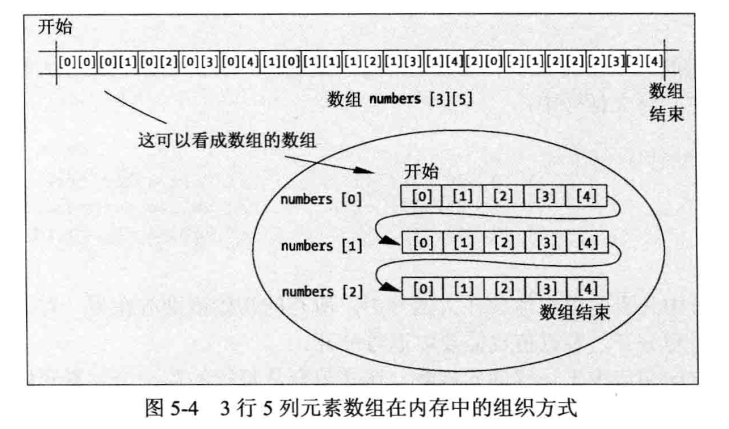第五章 数组 赤壁矶头千古浪,铜鞮陌上三更月。
定义一个数组 定义一个数组
long numbers[10];
方括号里面要有明确的数
数组在内存中的组织方式:
下面看一个例子:
1 2 3 4 5 6 7 8 9 10 11 12 #include <stdio.h> int main () int data[5 ]; int i; for (i = 0 ; i < 5 ; i++){ data[i] = 12 * (i + 1 ); printf ("data[%d] Address: %p Content: %d\n" , i, &data[i], data[i] ); } return 0 ; }
首先,有一个问题,在for循环中定义i的时候会报错,例如:
for(int i = 0; i < 5; i++)
要想这么写的话要使用C99或者C11标准,得使用命令-std=c99 告诉编译器是使用的C99标准
寻址运算符 & 用于取一个变量的地址
下面的程序输出一些变量的地址:
1 2 3 4 5 6 7 8 9 10 11 12 13 14 15 16 17 18 19 20 21 22 23 #include <stdio.h> int main () long a = 1L ; long b = 2L ; long c = 3L ; double d = 4.0 ; double e = 5.0 ; double f = 6.0 ; printf ("A variable of type long occupies %u bytes." , sizeof (long )); printf ("\nHere are the address of some variable of type long:" ); printf ("\nThe address of a is: %p The address of b is: %p" , &a, &b); printf ("\nThe address of c is: %p" , &c); printf ("\n\nA variable of type double occupies %u bytes." , sizeof (double )); printf ("\nHere are the address of some variable of type double:" ); printf ("\nThe address of d is: %p The address of e is: %p" , &d, &e); printf ("\nThe address of f is: %p\n" , &f); return 0 ; }
输出如下:
A variable of type long occupies 4 bytes.
A variable of type double occupies 8 bytes.
变量在内存中的地址如下:
在变量d和c的地址之间有一个空隙。为什么?许多编译器给变量分配内存地址的时候,其地址都是变量字节数的倍数,所以4字节变量的地址是4的倍数,8字节变量的地址是8的倍数,这就确保内存的访问是最高效的
数组的初始化 下面给出了包含5个元素的数组,并给出了初始值
double values[5] = {1.5, 2.5, 3.5, 4.5, 5.5};
如果初始化的值小于的个数小于数组中元素的数量,则初始化前面的元素:
double values[5] = {1.5, 2.5, 3.5};
数组中的前三个值为 1.5, 2.5, 3.5 其余的值为0;
如果不对数组进行初始化,那么会输出什么呢?
double values[5];
如果不进行初始化,那么编译器会把数组变量初始化为0;
在对数组进行初始化的时候也可以不指定元素的个数,编译器会自动推断出数组的个数
int primers[] = {1, 2, 3, 4, 5, 6, 7}
确定数组的大小 在有些场景下,我们需要知道一个数组的大小,那么如何确定一个数组的大小呢?
使用sizeof()方法
double values[5] = {1.5, 2.5, 3.5, 4.5, 5.5};
size_t element_count = sizeof(values)/sizeof(values[0]);
sizeof() 方法返回的是 size_t 类型的数据
size_t 是一个整数类型,类似于 int long.
多维数组 同一维数组类似
float numbers[3][5];
多维数组在内存中的组织方式:
更多维的数组也是如此,原理和定义方法都是一样的。
井字游戏 自己写的代码如下:
1 2 3 4 5 6 7 8 9 10 11 12 13 14 15 16 17 18 19 20 21 22 23 24 25 26 27 28 29 30 31 32 33 34 35 36 37 38 39 40 41 42 43 44 45 46 47 48 49 50 51 52 53 54 55 56 57 58 59 60 61 62 63 64 65 66 67 68 69 70 #include <stdio.h> int main () int player = 0 ; int winer = 0 ; int choice = 0 ; unsigned int row = 0 ; unsigned int column = 0 ; char board[3 ][3 ] = {{'1' , '2' , '3' },{'4' , '5' , '6' }, {'7' , '8' , '9' }}; unsigned int i; for (i = 0 ; i < 9 && winer == 0 ; ++i){ printf ("\n" ); printf (" %c | %c | %c\n" , board[0 ][0 ], board[0 ][1 ], board[0 ][2 ]); printf ("---+---+---\n" ); printf (" %c | %c | %c\n" , board[1 ][0 ], board[1 ][1 ], board[1 ][2 ]); printf ("---+---+---\n" ); printf (" %c | %c | %c\n" , board[2 ][0 ], board[2 ][1 ], board[2 ][2 ]); player = i%2 +1 ; printf ("请player%d选择一个下子的位置:\n" , player); scanf ("%d" , &choice); while (choice > 9 || choice < 1 || board[(choice-1 )/3 ][(choice-1 )%3 ] == 'X' || board[(choice-1 )/3 ][(choice-1 )%3 ] == 'O' ){ printf ("你输入的位置不正确,请重新输入:\n" ); scanf ("%d" , &choice); } board[(choice-1 )/3 ][(choice-1 )%3 ] = player == 1 ? 'X' : 'O' ; printf ("player%d落子成功!\n\n" , player); if (board[(choice-1 )/3 ][0 ] == board[(choice-1 )/3 ][1 ] && board[(choice-1 )/3 ][0 ] == board[(choice-1 )/3 ][2 ]){ printf ("比赛结束! player%d 赢得了比赛!" , player); break ; } if (board[0 ][(choice-1 )%3 ] == board[1 ][(choice-1 )%3 ] && board[0 ][(choice-1 )%3 ] == board[2 ][(choice-1 )%3 ]){ printf ("比赛结束! player%d 赢得了比赛!" , player); break ; } if (board[0 ][0 ] == board[1 ][1 ] && board[0 ][0 ] == board[2 ][2 ]){ printf ("比赛结束! player%d 赢得了比赛!" , player); break ; } if (board[2 ][0 ] == board[1 ][1 ] && board[2 ][0 ] == board[0 ][2 ]){ printf ("比赛结束! player%d 赢得了比赛!" , player); break ; } } printf ("\n" ); printf (" %c | %c | %c\n" , board[0 ][0 ], board[0 ][1 ], board[0 ][2 ]); printf ("---+---+---\n" ); printf (" %c | %c | %c\n" , board[1 ][0 ], board[1 ][1 ], board[1 ][2 ]); printf ("---+---+---\n" ); printf (" %c | %c | %c\n" , board[2 ][0 ], board[2 ][1 ], board[2 ][2 ]); if (i == 9 ){ printf ("\n\n和局,请再来一局!" ); } return 0 ; }
这个程序有一个问题就是当输入的choice为一个字母的时候,while循环会一直循环不停止
……
书上的代码如下:
1 2 3 4 5 6 7 8 9 10 11 12 13 14 15 16 17 18 19 20 21 22 23 24 25 26 27 28 29 30 31 32 33 34 35 36 37 38 39 40 41 42 43 44 45 46 47 48 49 50 51 52 53 54 55 56 57 58 59 60 61 62 63 64 65 66 67 68 #include <stdio.h> int main () int player = 0 ; int winner = 0 ; int choice = 0 ; unsigned int row = 0 ; unsigned int column = 0 ; char board[3 ][3 ] = {{'1' , '2' , '3' },{'4' , '5' , '6' }, {'7' , '8' , '9' }}; unsigned int i; for (i = 0 ; i < 9 && winner ==0 ; ++i){ printf ("\n" ); printf (" %c | %c | %c\n" , board[0 ][0 ], board[0 ][1 ], board[0 ][2 ]); printf ("---+---+---\n" ); printf (" %c | %c | %c\n" , board[1 ][0 ], board[1 ][1 ], board[1 ][2 ]); printf ("---+---+---\n" ); printf (" %c | %c | %c\n" , board[2 ][0 ], board[2 ][1 ], board[2 ][2 ]); player = i%2 +1 ; do { printf ("Player %d, Please enter a valid square number " "for where you want to place your %c:" , player, (player == 1 ) ? 'X' : 'O' ); scanf ("%d" , &choice); row = --choice/3 ; column = choice % 3 ; }while (choice < 0 || choice > 8 || board[row][column] > '9' ); board[row][column] = (player == 1 ) ? 'X' : 'O' ; if (board[row][0 ] == board[row][1 ] && board[row][0 ] == board[row][2 ]){ printf ("比赛结束! player%d 赢得了比赛!" , player); break ; } if (board[0 ][column] == board[1 ][column] && board[0 ][column] == board[2 ][column]){ printf ("比赛结束! player%d 赢得了比赛!" , player); break ; } if (board[0 ][0 ] == board[1 ][1 ] && board[0 ][0 ] == board[2 ][2 ]){ printf ("比赛结束! player%d 赢得了比赛!" , player); break ; } if (board[2 ][0 ] == board[1 ][1 ] && board[2 ][0 ] == board[0 ][2 ]){ printf ("比赛结束! player%d 赢得了比赛!" , player); break ; } } printf ("\n" ); printf (" %c | %c | %c\n" , board[0 ][0 ], board[0 ][1 ], board[0 ][2 ]); printf ("---+---+---\n" ); printf (" %c | %c | %c\n" , board[1 ][0 ], board[1 ][1 ], board[1 ][2 ]); printf ("---+---+---\n" ); printf (" %c | %c | %c\n" , board[2 ][0 ], board[2 ][1 ], board[2 ][2 ]); if (i == 9 ){ printf ("\n\n和局,请再来一局!" ); } return 0 ; }
书上的代码也有同样的问题,输入一个非数字就会陷入while无限循环。


